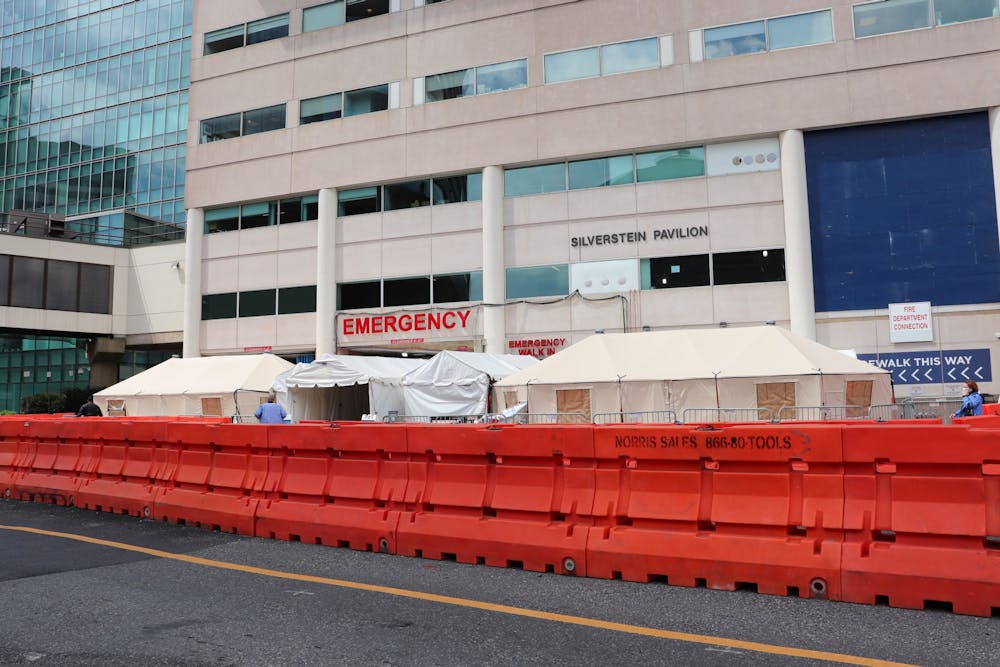Nursing students fear a deficit of clinical hours caused by the University's spring semester cancellation of in-person labs and clinical rotations could put their graduation and licensure at risk.
Although Nursing students were initially told they could continue their clinical rotations, the University's School of Nursing announced on March 13 that Penn Medicine and its affiliates had placed an indefinite hold on the clinical placements at their facilities. Penn Nursing is still awaiting instructions from its clinical partners about how and when clinical rotations can begin again.
Clinical rotations provide hands-on experience for Nursing students to interact with patients in hospitals throughout the Philadelphia region, including Penn Medicine facilities. State regulations mandate that in order to receive a license to practice, students must complete a certain number of clinical hours over their four years of study.
After clinical placements were placed on hold, Nursing faculty worked to find adequate online solutions to ensure all students could remain on track for requirements needed for graduation.
All graduating seniors enrolled in NURS 390 Leadership in the Complex Healthcare System preceptorships were allowed to remediate their hours by completing modules of an online simulation platform called i-Human Patients, graduating Nursing senior Heidi Chiu said.
A preceptorship class aims to aid the transition between learning and clinical practice, allowing students to develop specific expertise in a clinical area of their choice.
After completing the online modules, graduating Nursing senior Selena Huang said nearly everyone in the senior class was cleared to graduate on time. Huang said she and other students in her clinical group were concerned, however, since the online simulations weren’t tailored to the specific area they had chosen for their preceptorship.
“I feel like I missed out on a lot of knowledge related to critical care,” Huang said.
RELATED:
Canceled Nursing clinicals throw graduation and future course planning into disarray
UA fills vacant Nursing seat with special election – but only 17 people voted
Penn Nursing receives most NIH funding for third consecutive year
Even after meeting their clinical requirements, Chiu said many graduating Nursing seniors are having difficulties applying to jobs.
Test dates for the National Council Licensure Examination, the nationwide exam that nurses take to receive their licenses, were delayed for a few weeks in March in response to the COVID-19 pandemic. Although testing has restarted, applicants are facing long processing times of up to seven to 12 weeks in states such as Pennsylvania, New Jersey, and California.
Huang, who registered to take the exam in California, said she still has to wait about 10 weeks for her application to take the exam to process.
Many employers at facilities popular with Penn graduates, like Penn Medicine, require nurses to receive their license before starting the job.
Huang said her interview at NYU Langone was postponed because she has not taken the NCLEX yet. Chiu and Huang added that many nursing residencies, which grant jobs to graduates who have scheduled an NCLEX test date but have not yet been licensed, have also been canceled.
Rising Nursing seniors were able to complete their Psychiatric nursing clinical component before spring break but they didn't finish their Pediatric nursing rotations, which were scheduled for later in the semester.
Instructors for NURS 225 Pediatric Nursing, which includes 12 hours of clinical rotations and two hours of lab per week, opted to have students watch recorded online scenarios for lab, but chose not to pursue an online clinical solution, rising Nursing senior Jamie Chung said.
In an internal announcement sent to Nursing students prior to advanced registration, professors instructed students to keep their Fridays, Saturdays, and Sundays open for possible makeup clinicals should the campus reopen in the fall.
Since rising seniors had not met their clinical instructors by the time online learning started, Chung said there was confusion about the expectations for the course, especially as lectures deviated from their original Monday/Wednesday schedule to Mondays through Thursdays in some weeks.
Like the graduating Nursing seniors, rising Nursing juniors used i-Human Patients to make up their clinical hours for NURS 215 Nursing of Women and Infants. Clinical rotations had already started before students were sent home and were supposed to continue through the rest of the Spring semester.
Rising Nursing junior Hannah Pinheiro said although the alternative solutions to missed clinicals were not ideal, she thought the faculty did a great job ensuring students had the best experience possible given the circumstances.
“I’m actually quite impressed that the faculty pulled this together on such short notice, but I truly do think that it’s impossible to find an online simulation that will be as realistic as being on the floor,” Huang said.









